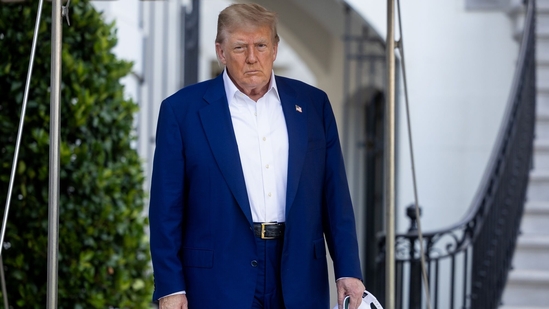Former U.S. President’s blunt message stirs global reactions as Middle East teeters on edge of fragile peace

Iran
In typical fashion, former U.S. President Donald Trump has once again inserted himself forcefully into a high-stakes global crisis — this time with an all-caps message directed at Israel during its escalating conflict with Iran.
On June 23, Trump posted a blunt message on his social media platform, Truth Social: “BRING YOUR PILOTS HOME, NOW!”, referring to Israel’s continued air operations over Iran and Syria, just as a tentative ceasefire agreement was reportedly being finalized. The message quickly went viral, sparking reactions from world leaders, military analysts, and the global public.
🔴 Trump’s Message: A Demand or a Warning?
Trump’s capitalized demand came at a critical moment. Reports had emerged of a phased ceasefire deal brokered behind the scenes, in which Iran and Israel were to begin suspending military operations over a 24-hour period. Trump himself claimed partial credit for the breakthrough, writing in a separate post that the war was ending “exactly 12 days after it began” thanks to “American strength.”
But his follow-up—“BRING YOUR PILOTS HOME, NOW!”—struck a different tone. It was read by some as a command, by others as a veiled warning, and by critics as another example of Trump’s tendency to disrupt diplomacy with blunt-force rhetoric.
✈️ Israeli Air Campaign at a Crossroads
At the time of Trump’s message, Israeli fighter jets were still active across multiple regions, reportedly targeting Iranian air defense infrastructure, Hezbollah positions in Syria, and suspected missile storage depots in Iraq. Despite a pause in major strikes since June 22, low-level aerial activity continued, raising questions about Israel’s willingness to commit to a full ceasefire.
Trump’s post implied urgency: a sense that any further airstrikes could not only endanger pilots but unravel the fragile truce taking shape.
An Israeli official, speaking anonymously, responded to the remark tersely:
“We appreciate President Trump’s concern. Our pilots fly on behalf of the entire nation’s security.”
🕊️ The Ceasefire Deal in Detail
According to leaked diplomatic sources, the Iran-Israel ceasefire, which Trump said would be implemented in two stages (12-hour and 24-hour periods), involved the following:
- Iran would halt all missile and drone strikes by 6 a.m. local time.
- Israel would stand down its air campaign starting 6 p.m. the same day.
- A full cessation of hostilities would be marked by midnight, pending no retaliatory action by either side.
While Trump hailed it as a “tremendous” deal, it was brokered with help from Omani, Qatari, and Swiss diplomats — and reportedly without formal U.S. government involvement.
🌍 Reactions from Around the Globe
Trump’s dramatic interjection divided opinion:
- Supporters praised it as “decisive leadership,” suggesting it might have prevented further escalation.
- Critics accused Trump of overstepping and undermining formal diplomacy, especially as the Biden administration had been working quietly to support the ceasefire efforts.
- European officials found the tone “unhelpful” but acknowledged that Trump’s pressure may have accelerated decision-making in Jerusalem.
In Tehran, the Supreme Leader’s spokesperson dismissed the message as “irrelevant noise,” but Iranian state media repeatedly aired the post, framing it as a signal that even America’s hawks were now urging restraint.
🇺🇸 Trump’s Broader Strategy
Trump’s comments are widely seen as an attempt to shape global opinion ahead of the 2024 U.S. elections. Though out of office, his social media posts still command massive influence, especially among Republican voters and global right-wing networks.
In earlier posts, Trump warned that further strikes on Iranian soil could “ignite regional war,” adding, “We have won. Now walk away.”
Analysts say Trump’s current stance contrasts sharply with his previous “maximum pressure” approach during his presidency, which included withdrawing from the Iran nuclear deal and approving the assassination of General Qasem Soleimani.
⚠️ What Comes Next?
With no formal treaty signed, and only unofficial statements from involved parties, the world watches warily:
- Will Israel actually ground its aircraft?
- Can Iran restrain its proxies in Lebanon and Iraq?
- Is Trump setting the tone for America’s future Middle East policy—or simply shouting from the sidelines?
🧭 Conclusion: Diplomacy or Disruption?
Trump’s all-caps message may have grabbed headlines, but its long-term impact is still uncertain. Whether viewed as a deterrent or a distraction, “BRING YOUR PILOTS HOME, NOW!” underscores how volatile the Iran-Israel situation remains—and how influential Trump’s voice still is in global affairs, even from outside the Oval Office.
As the 24-hour clock on the ceasefire ticks down, leaders in Tel Aviv, Tehran, and Washington must decide whether they’ll listen to Trump—or chart their own paths to peace.
Thanks For Reading